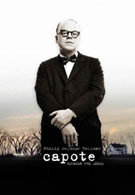The thin line between right and wrong is examined in Capote, a compelling biopic about the famous author during the time he wrote “In Cold Blood.” Truman Capote, played to perfection by Philip Seymour Hoffman, was a fascinating figure with equal layers of talent and flaw. He could own the spotlight and make anyone laugh with his effeminate nature and clever jokes, but underneath he was a truly tortured and dependent soul. The world loved him after “Breakfast at Tiffany’s, and he became an accomplished writer that yearned for a change of pace. After reading an article about a slain family of four in Kansas, his life and the face of American literature were forever altered.
“In Cold Blood” is a non-fiction novel about 2 scumbags that murdered a family in their own home in 1959. The killers, Perry Smith (Clifton Collins Jr.) and Dick Hickock (Mark Pellegrino) committed the crimes for thousands of dollars, which they never actually found. They ended up leaving with $50 in their pockets, not quite the big lottery they were looking for. Capote goes to research the case, and along with him is his childhood friend Harper Lee (Catherine Keener), author of “To Kill a Mockingbird”. He’s drawn to and bewildered by the violent murders, noticing in the crime scene photos that the young boy’s head was tucked nicely onto a pillow, before being blasted off by a shotgun. Why would someone care enough to make someone comfortable before sending them to an early resting place?
Perry Smith is not your average criminal, and that is part of the horror of the whole thing. He likes to read, keeps personal diaries, and has the soulful eyes of Robert Downey Jr. Capote (a gay man), in his own way falls in love with Perry, but his desire to spend time with him is at constant odds with the need for him to be executed so he can finish his book. He finds the killers a lawyer, delaying their death sentences, and he visits regularly, even feeding Perry baby food when he is starving. They have an extraordinarily moving and confusing bond, leaving Capote torn between caring for Perry and wanting to exploit him for a story.
Capote is the best movie I’ve seen so far this year, and there is not enough praise to shower upon it. It works on every possible level, with strong performances and believable dynamics that creatively bring a tragic story to life. Philip Seymour Hoffman is one of the most talented actors working today, and if his performance in the film doesn’t earn him an Oscar, then the voting committee has clearly undergone a lobotomy. Rather than doing a deadpan impersonation, Hoffman encompasses Capote’s every movement and emotion, from his flamboyant persona to the wounded, spoiled child inside of him.
Unlike most biopics that scan the course of a person’s life without ever allowing us to truly know them, Capote revolves around a few crucial years in the turning point of Truman’s life. Not since Dead Man Walking has a movie been able to delve as deeply into the lives associated with a horrific criminal act, and realistically show the impact it has on the people involved. Different angles are told, but there is not a clearly mapped out path of who to like or dislike. These are well-rounded, flawed, real people, without a caricature in sight. Nothing is black and white as Capote beautifully expresses the multiple shades of grey people try to ignore. It’s more than just a movie; it’s an experience, and one you won’t want to miss.
Your Daily Blend of Entertainment News

